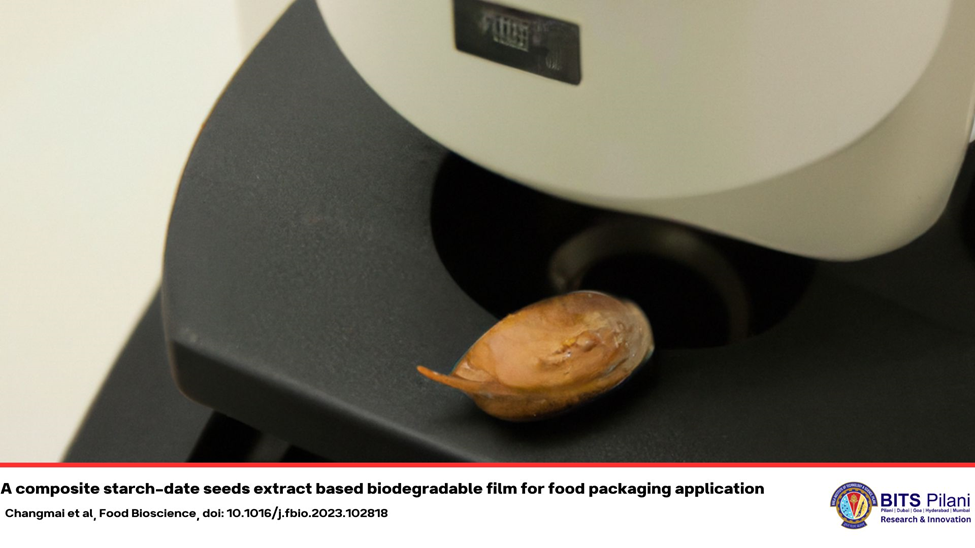Producing Biodegradable Films for Food Packaging from Starch and Date Seeds In the United Arab Emirates (UAE), plastic wrappings are extensively used to store perishable foods such as fruits and vegetables. These single-use plastics greatly increase the shelf life of most food items during transport and storage by protecting them from the arid climate of the region. But food-grade plastics are made from non-renewable petroleum resources and utilise non-biodegradable materials. Their large-scale disposal, thus, adds to the global concern of plastic pollution.
In efforts to find more sustainable and ecofriendly alternatives to plastic, a team of scientists has now developed a new type of biodegradable film made from natural polymers which could soon change the food packaging game. The team includes Mr. Yatik Thakwani, Mr. Anugraha Karwa, Professor Prakash Kumar BG, and Assistant Professor Murchana Changmai from the Department of Chemical Engineering at the Dubai Campus of the Birla Institute of Technology and Science (BITS) Pilani in the UAE.Their work is published in Food Bioscience.
The novel film is a composite, meaning that it is made from a combination of various materials. The base material of the film is starch, one of the most widely available natural polymers. While starch is inexpensive and easily moldable at high temperatures, it lacks many important properties to make a good wrapping material by itself, including high mechanical strength, flexibility, and impermeability.
To address these issues, the researchers added either chitin or cellulose to the mix. These natural polymers altered the resulting films in various regards. They enhanced the tensile strength of the films, increasing their load bearing capacity to a great extent. Also, chitin or cellulose improved the water vapor permeability and hydrophobicity of the films, helping them retain the original moisture content of the wrapped items while alsoserving as a water barrier.
The final and perhaps the most innovative ingredient included in the composite films was an extract made from date seeds. Previous studies had shown that date seeds contain various compounds with antioxidant and antimicrobial properties. The research team theorised that they could transfer these properties to their films by adding a small amount of date seed extract, prepared by simply grinding, boiling, and pressing the seeds and separating the resulting oil from water.
The researchers tested the antibacterial properties of their films by observing their effects on cultures of Escherichia coli, a species of bacteria found in fruits and vegetables contaminated with animal feces. As expected, the bacteria could not grow at all near films that contained the date seed extract. In another experiment, the researchers showed that composite films containing date seed extract could keep blueberries fresh for a longer period, thanks to their antibacterial and antioxidant qualities.
Using date seeds to enhance the films is particularly convenient in terms of sustainability, as Dr. Changmai explains: “Date fruit, which comes from the species
Phoenix dactylifera, is found abundantly in the Middle East. While the flesh is mostly consumed, the pits are normally discarded.” Thus, this choice adds an entirely new area of application for cultivated date palms.
The researchers also ran tests to measure how long it took for the films to degrade naturally. To this end, they buried films of different compositions into pots with composted soil and kept a weekly record of the weight of each film. For some specific compositions, the films had completely disintegrated by the fifth week, suggesting that they were fully biodegradable. These results are very promising since the long-lasting nature of current plastic wrappings is a major concern. “Biodegradability is one of the major requirements for natural polymer-based packaging films and underlies their sustainability and environmental friendliness,” remarks Dr. Changmai.
Lastly, the team analysed some of the economic aspects related to the manufacturing of the proposed films. They calculated how much different film compositions would cost based on the price of their raw materials. Overall, the production of the films appears to be economically feasible.
Taken together, the findings of this study highlight the potential of films made from natural polymers and date seed extracts. They may be especially useful for packaging perishable food items such as fruits and vegetables, one of the main sources of non-biodegradable plastic waste.
“Plastic pollution is a huge global problem, and it is high time that everyone realizes the tremendous economic, health, social, and environmental impacts it leaves behind. It is of utmost importance to opt for environment-friendly products and replace synthetic plastics with natural biodegradable varieties which can act as a small ripple for greatersustainability goals,” concludes Dr. Changmai.
The researchers will be conducting additional experiments on their films and look for ways to further improve their mechanical properties. With any luck, we may be quickly heading toward a future with reduced amounts of single-use plastics.
















